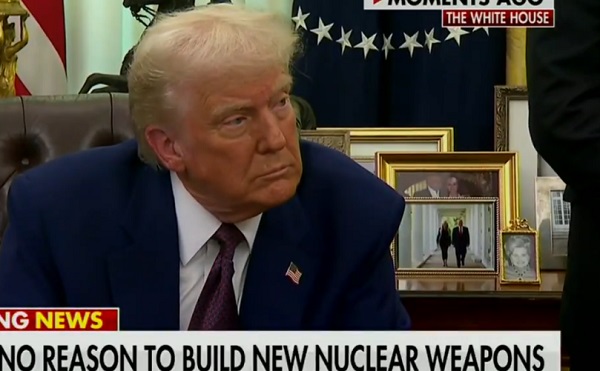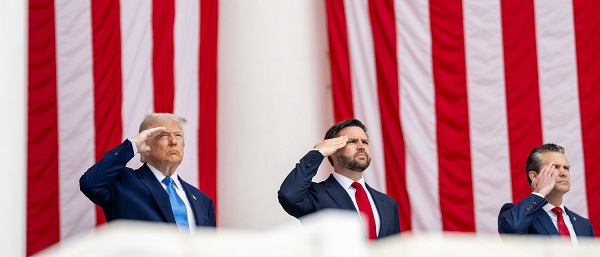conflict
Trump proposes US, Russia, China scale back nuclear weapons and military budgets

From LifeSiteNews
By Stephen Kokx
The U.S. president is focusing not only on a resolution in Ukraine but bringing peace to the world while pivoting away from Europe.
As the Trump administration’s foreign policy begins to take shape, political observers are looking for clues as to what the next four years will look like. Remarks Donald Trump made while in the Oval Office this week about Russia and China are helpful in this regard.
While seated behind the Resolute Desk — with a portrait of Ronald Reagan hanging over his left shoulder — Trump encouragingly told reporters that “one of the first meetings I want to have is with President Xi of China, President Putin of Russia, and I want to say, ‘let’s cut our military budget in half.’ And we can do that.”
Trump exuberantly added, “President Putin and I agreed that we were going to be (de-nuclearizing) in a very big way … we already have so many you could destroy the world 50 times over, 100 times over.”
Trump’s comments came after he had spoken to Putin by phone, a call where they also agreed to “start negotiations immediately” to end the Ukraine conflict.
Trump’s desire to engage with — as opposed to simply attack — two countries that have long been described as America’s biggest adversaries is a breath of fresh air as it shows he is willing to break with past (failed) operating procedures that have done nothing but increase profits for defense contractors and have heightened the likelihood of a world war breaking out.
At present, the U.S. military has an annual budget of around $850 billion. That is roughly the size of the next nine largest militaries in the world combined. For comparison’s sake, Russia and China purportedly spend $145 billion and $290 billion each year, respectively, on defense.
The U.S. and Russia currently account for the vast majority of the world’s nuclear weapons, collectively owning 11,000. Fox reported that the U.S. has 3,748 nuclear warheads as of September 2023. In the late 1980s, that number was a whopping 22,217. Russia reportedly has 4,380, and China possesses around 600.
A coup for freedom
Trump’s remarks can only be appreciated within the context of recent developments. Not only has the president begun the dismantling of USAID, he instructed his Secretary of Defense and Vice President to put the world on notice that he intends to realign the U.S. toward a more hemispheric focus within a multi-polar world.
Speaking in Munich on Friday, Vice President JD Vance informed European technocrats that their decades-long, U.S.-subsidized vacation from self-reliance has come to an end.
“It’s important in the coming years for Europe to step up in a big way to provide for its own defense,” Vance told a stunned crowd.
“The threat that I worry the most about vis-a-vis Europe is not Russia, it’s not China, it’s not any other external actor … what I worry about is the threat from within; the retreat of Europe from some of its own fundamental values.”
Vance’s remarks were not well received. Liberal German Defense Minister Boris Pistorius whined that “this is not acceptable,” a comment that prompted anti-war activist Daniel McAdams and Republican U.S. Sen. Mike Lee of Utah to call on the United States to leave Europe behind altogether.
Vance followed his historic broadside by holding a meeting with Ukrainian President Volodymyr Zelenskyy. Early reports indicate that Vance essentially told him to pound sand. Curt Mills of The American Conservative shared the following crucial observation on X:
Secretary of Defense Pete Hegseth delivered an equally forceful message at NATO headquarters in Brussels this past week.
“The United States does not believe that NATO membership for Ukraine is a realistic outcome of a negotiated settlement,” he said, shattering the dreams of globalists around the world.
If Trump is successful in bringing peace to Ukraine and if he negotiates a lasting deal with Russia and China — all while defanging the U.S. Deep State and stopping the war in the Middle East — he will have accomplished what no other modern president has ever done, and would be entirely deserving of the Nobel Peace Prize. He will have also lived up to his old 2016 promise of draining the swamp.
It’s still early, and plenty of things can go awry from now until 2028, but at this stage in the game, Trump 2.0 is shaping up to be what many of his initial supporters had hoped for the first time around.
Artificial Intelligence
AI Drone ‘Swarms’ Unleashed On Ukraine Battlefields, Marking New Era Of Warfare


From the Daily Caller News Foundation
Artificial intelligence-powered drones are making their first appearances on the battlefield in the Russia-Ukraine war as warfare creeps closer to full automation.
In bombardments on Russian targets in the past year, Ukrainian drones acting in concert were able to independently determine where to strike without human input.
It’s the first battlefield use of AI “swarm” technology in a real-world environment, a senior Ukrainian official and Swarmer, the company who makes the software, told the Wall Street Journal in a Tuesday report. While drones have increasingly defined modern battlefields, swarms until now had been confined to testing rather than combat.
“You set the target and the drones do the rest,” Swarmer Chief Executive Serhii Kupriienko told the WSJ. “They work together, they adapt.”
So far, the Swarmer technology has been used hundreds of times to target Russia assets, but was first used a year ago to lay mines on the front, the Ukrainian official told the WSJ. The software has been tested with up to 25 drones at once, but is usually utilized with only three.
Kupriienko told the WSJ that he was preparing to test up to 100 drones at once with the linking software.
A common arrangement used on the battlefield includes one reconnaissance drone to scout out the target and two explosive drones delivering the payload on target, the official told the WSJ.
While Western nations such as the U.S., France and the United Kingdom are also pursuing drone swarm technology, they have not deployed swarm technology on the battlefield the way Ukraine has, according to the WSJ. Currently, autonomous weapons are not regulated by any international authority or binding agreement, but ethical concerns around the technology has led many to call for increased regulation of weapons like the Swarmer system.
The Ukrainian Ministry of Foreign Affairs did not immediately respond to the Daily Caller News Foundation’s request for comment.
conflict
Trump Pentagon Reportedly Blocking Ukraine From Firing Western Missiles Deep Into Russia


From the Daily Caller News Foundation
The Department of Defense has spent months blocking the Ukrainian military from using American and British-made missiles to hit targets deep inside Russia, The Wall Street Journal reported Sunday, citing unnamed U.S. officials.
Undersecretary of Defense for Policy Eldridge Colby reportedly designed the procedure to review requests to carry out the long-range strikes with weapons that are either of U.S. origin or that require American intelligence or use components provided by the U.S., according to the WSJ. Secretary of Defense Pete Hegseth reportedly has the final say on whether Ukrainian forces can use the MGM-140 ATACMS (Army Tactical Missile System) to hit targets in Russia.
The reported blocks on missile strikes coincides with a Trump administration effort to broker a peace deal between Russia and Ukraine. A Pentagon spokesperson declined to comment further on the matter.
BREAKING: President Vladimir Putin reacts to B-2 Flyover pic.twitter.com/1mzVn7DxlW
— Jack Poso 🇺🇸 (@JackPosobiec) August 15, 2025
The Biden administration allowed Ukraine to carry out strikes with ATACMS in November, weeks after President Donald Trump won the 2024 election, the New York Times reported. Trump criticized the move during a December interview with Time magazine.
“It’s crazy what’s taking place. It’s crazy,” Trump said. “I disagree very vehemently with sending missiles hundreds of miles into Russia. Why are we doing that? We’re just escalating this war and making it worse. That should not have been allowed to be done.”
Trump and Russian President Vladimir Putin met in Alaska on Aug. 15 for a summit meeting during which Trump sought to secure a cease-fire in Russia’s war with Ukraine. As Trump greeted Putin, a B-2A Spirit stealth bomber and several fighters carried out a flyover of Elmendorf Air Force Base.
Trump met with Ukrainian President Volodymyr Zelensky and major European leaders on Aug. 18 to update them on the summit.
In July, Trump reached an agreement with NATO where members of the alliance would purchase weapons, including MIM-104 Patriot surface-to-air missiles, and donate them to Ukraine.
-

 Alberta24 hours ago
Alberta24 hours agoFrom Underdog to Top Broodmare
-

 Energy2 days ago
Energy2 days agoPoilievre says West Coast Pipeline MOU is no guarantee
-

 Alberta2 days ago
Alberta2 days agoCarney forces Alberta to pay a steep price for the West Coast Pipeline MOU
-

 Alberta2 days ago
Alberta2 days agoWest Coast Pipeline MOU: A good first step, but project dead on arrival without Eby’s assent
-

 Energy2 days ago
Energy2 days agoWill the New West Coast Pipeline MoU Lead to Results? Almost Certainly Not According to AI
-

 Business1 day ago
Business1 day agoHigher carbon taxes in pipeline MOU are a bad deal for taxpayers
-

 COVID-192 days ago
COVID-192 days agoCanadian government seeking to destroy Freedom Convoy leader, taking Big Red from Chris Barber
-

 Alberta23 hours ago
Alberta23 hours agoREAD IT HERE – Canada-Alberta Memorandum of Understanding – From the Prime Minister’s Office








